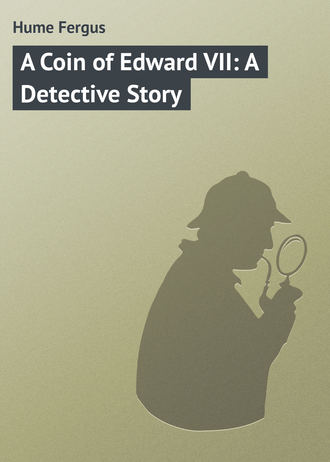
A Coin of Edward VII: A Detective Story
"Dane," he said, after a pause, "you appear to have much good in you, and the Princess Olga is anxious to save you from yourself. Since you are helping us to break up this gang and catch Morley, who appears to be the arch-criminal, I am willing to do what I can to save you from the law. But there is another crime – "
"What particular crime do you mean, sir?" asked Dane quietly.
"The murder of Miss Kent."
Dane started. "Do you believe that I had anything to do with that?"
"Why not? You were at Rickwell on the night it was committed."
"I was. I came over from the yacht at Gravesend to tell Morley she was waiting his orders there, and to tell Denham also. He had appointed a meeting there for me. I came on a motor-bicycle. What of that?"
"A man called Scott told Steel that you were in Rickwell."
"I admit it. I know Scott. He has turned King's evidence. It seems to me, sir, that the whole lot of us will be pardoned if we are so anxious to betray one another. But this crime – "
"Denham says you killed the girl."
Dane sprang to his feet with flashing eyes. "I swear by all that I hold most holy that I did not touch the girl," he declared. "I never even set eyes on her. Denham accuses me – yes, because I have told the truth about him. I came on that night and saw Morley and him at the window of the library in Morley's house. When I gave my message about the yacht I returned to Tilbury, and then crossed to the boat. I never killed the girl, by the memory of my mother!"
"You seem to be speaking the truth," said Giles quickly. "Did you enter the library? The girl was killed by a stiletto torn from the trophy of arms near the desk."
"I was not in the library. Morley would not allow me to enter. He and Denham spoke to me on the terrace. When a noise was heard at the door – I believe now it was Miss Anne who was entering – Morley gave me the tip to get away."
"Was the stiletto in its place?"
"I don't know. I never noticed."
"Do you think Morley killed the girl?"
"Either he or Denham," replied Dane decisively; "and I think it was the latter. When I heard of the crime being committed, I saw Mrs. Morley and asked her if her husband was guilty. She denied it, saying that he was in the library all the time. She came down and saw him."
"She might do that to save her husband."
Dane shook his head. "I don't think she was fond enough of him for that, sir," he answered. "She was when he married her; but he treated her so badly – as I was told by Denham – that she grew to hate him. He spent her money, and behaved like the brute he is. For the sake of her children she said nothing, but she was fond of Miss Kent, and I don't think she would have defended him if a charge of killing the girl had been made."
"Did Mrs. Morley know anything about the gang?"
"No, she knew nothing. Morley always took good care to keep her in ignorance. She knew no more of his secret life than Miss Anne did of Denham's. Both men were very clever in concealing that which they did not want to be known. But you believe that I am innocent of this charge?"
"Yes. You can face Denham when you return and ask him what are his grounds for accusing you."
"If ever I do come back," said Dane gloomily. And the conversation ended for the time being.
Dane made himself very useful on board, and Calthorpe took quite a fancy to him. In addition to his other gifts he proved to be an excellent sailor. It seems that he had run away from home, and had worked for some years before the mast as a common seaman. He now wished to do what he could on board The Firefly, and chummed with the crew. So great a favorite did he become with Calthorpe that when he asked to be allowed to steer, the favor was readily granted to him, and he proved very proficient. Certainly Calthorpe did not know he was a suspected murderer and had been a thief, and neither Steel nor Giles said anything about this. Steel, indeed, still held to the belief that Dane was guilty; but Ware laughed at him.
"You said that Miss Anne was guilty," he declared; "then you believed that Denham had struck the blow; now you are convinced that Dane is the criminal. For my part I believe Denham to be guilty."
"He may be," replied Steel, with a shrug. "I am so puzzled over this case that I am prepared for any development. At all events, Denham is being looked after. He can't escape me, whether he is merely a thief or really the murderer we are in search of."
When The Firefly got into the Bay of Biscay the weather was worse than ever. Giles was pleased, as Calthorpe told him that there was the better chance of catching The Dark Horse before she reached her port of destination. Once on Spanish soil and Giles feared lest Morley should carry Anne off to the mountains. He was such a scoundrel, and so clever, that it might be possible he had confederates at Bilbao to help him to carry out any scheme he might suggest. Giles wished to catch him before he had time to formulate any new villainy. At all events, Morley would never think that they had tracked him so speedily, or had followed so rapidly. It was unlikely that he would use the yacht to the fullest extent of her steaming powers.
In the centre of the Bay The Firefly was caught by the full force of the storm. The wind and waves were terrific, but the gallant little boat proved herself trustworthy. Under a sullen sky, over a dismal grey sea she steamed, her decks streaming with water, and the ship herself rolling terribly.
Calthorpe did not slacken speed, and the boat responded splendidly to his handling. A sharp lookout was kept by all on board for the yacht, as Giles had offered a large reward for the first man who espied the boat. But the difficulty was that none of the crew knew the looks of The Dark Horse. However, they were to hail when they saw anything in the shape of a yacht, and there were one or two false alarms. At length, when The Firefly was approaching the Spanish coast, Dane, who was on deck with a glass, gave the alarm. It was a misty, grey day, with absence of sun and wind. The ocean was heaving like masses of liquid pitch with an oily look, and the yacht cut sheer through the terrific waves that threatened to overwhelm her. Suddenly a wind rose, there was a blink of sunshine, and about a mile away a bark was seen rolling in the trough of the sea. "There she is!" roared Dane, and every one came on deck.
"Are you sure?" cried Giles, taking the glass.
"Perfectly sure," replied Dane, who was dangerously excited. "Captain, let me handle the wheel as a reward."
Calthorpe gave his assent, as he knew what a good steersman Dane was. He then took his post beside Giles and Steel, who were admitted on to the bridge, and thence directed the ship. Then The Firefly made a bee-line for the distant ship.
Steel and Giles had less sense than they should have had; and Dane in his joy at the sight of his prey quite forgot that with a good glass Morley could recognize them all three. It was The Red Cross, alias The Dark Horse, that was steaming leisurely southward, and doing her best to battle with the strong seas that hammered her newly painted sides. Thus Morley, who had never expected such promptitude, became aware that his foes were at his heels. He saw the detective and Giles on the bridge. But Dane he did not see, being in too much of a hurry after his first glimpse of the danger to take further interest in those on board The Firefly. The result of Morley's decision was that those on the pursuing yacht saw clouds of smoke pouring out of the funnel, and knew that the furnaces were being crammed to suffocation. There was a shout of joy from The Firefly's crew, for now the fun was beginning.
"We'll see if she'll beat my boat," said Calthorpe on the bridge.
It was very stormy, and black clouds were racing across a pallid sky. A furious wind had blown the mists into shreds of vapor, and was ripping white spume from the tops of the rearing waves. The vessel in flight soared like a swallow, and slid down into mile-long valleys; but The Firefly, having more powerful engines, tore straight through the walls of water that threatened to block her way. She trembled with the vibration of her screws, and in the stormy heaving of the water there was great danger lest her propeller fans should snap. However, the engineer stood with his hand on the throttle-valve, and stopped the spinning of the screws when they emerged.
Much the same tactics were being pursued on board The Dark Horse, save that in addition the safety-valve was tied down. The engines worked at furious speed, and the boat leaped like a hunted stag. But the hound on its heels came closer and closer, and those on The Dark Horse could hear the roar of the delighted Firefly crew. Morley ground his teeth, and fed his furnaces again. Anne came on deck.
"Go below!" he said, and swore at her.
"I shall not," she retorted, and got away from him.
He was not able to pursue, not being in position to leave his post beside the captain. Besides, he thought it mattered very little whether she was seen or not. Ware knew that she was on board, and, moreover, if The Dark Horse were overhauled, he would suffer most himself by the capture. It would do him no good to throw Anne overboard, although he felt much inclined to do so if only for revenge.
Calthorpe could well be proud of his boat. She responded gallantly to the strain put upon her, and tore like a mad thing through the waste of waters. She swung 'longside of The Dark Horse, Dane steering with flashing eyes and his long hair streaming in the wind. There was less than a quarter of a mile separating the boats. Morley swerved to the right. Dane followed. A pretty bit of steering on the part of both vessels took place until the winds and waves took command. Then the boats, out of hand, swung together, almost touching. Giles could see Anne. She cried out and stretched her hands.
Suddenly Dane turned the yacht in a circle. Calthorpe shouted to know, with several adjectives, what he was up to. He would have stopped the engines, which were working furiously, but that it was dangerous at the moment. The Firefly swung round, and then with the rush of a wounded bull came straight at The Dark Horse.
"Hell!" cried Calthorpe, "he's going to ram her."
There was no time to stop the engines, or to reverse them. Those on The Dark Horse gave a yell of fear as the larger vessel bore down on their slighter craft. Dane, fairly mad, shouted out abuse to Morley. Another moment and the pursuing yacht struck the other midships, cutting her almost to the waterline. All on board both ships were thrown down. The Firefly reeled back. Giles lifted his head to see Anne falling overboard as The Dark Horse lurched in the roaring waters. With a cry of terror, he tore a lifebelt from its fastenings and threw himself after her.
After that he could only recollect that he was swimming for dear life and for her, amongst those furious waves. Lifted on the crest of one he saw her some distance away – a white figure against the black water. Then he went sliding down into the liquid valley. How he reached her he did not know; but after a terrific struggle he found her in his arms. He managed to slip the lifebelt over her head, and kept her up with one arm while he kept afloat with the other. She was insensible, but Giles retained all his wits. He caught a glimpse of the ragged, injured bows of The Firefly high above him, and saw that Calthorpe was launching a boat. In a few moments it came plunging towards him, and he was hauled on board with Anne. Steel was in the boat, ashy pale.
"Is our boat safe?" gasped Giles.
"Yes. But The Dark Horse is going down. Dane has gone overboard."
Suddenly Steel shrieked, and Giles turned to where he pointed. In the trough of the sea The Dark Horse was plunging like a colt, rolling like a drunken man. Giles saw Morley; near him Dane with a savage look on his face. Morley, with terror in his eyes, tried to get away, but Dane reached him, flung his arms round him, and with a wild shout both men went down into the furiously bubbling witch-caldron, never to rise again.
The strain of the whole terrible business was too much for Giles Ware. For the first and last time in his life he fainted. The last recollection he had was of seeing the doomed vessel plunging downwards and a cloud of white steam rising with a terrible roar from her exploding boilers. After that, darkness and insensibility.
CHAPTER XXVI
THE END OF THE TROUBLE
Giles returned to Rickwell within a week, to find that great changes had taken place in the place, even in that little while. After the foundering of The Dark Horse, the other yacht had returned to England forthwith. She had not been very badly damaged by Dane's mad act, although her bows had been smashed. Calthorpe, indeed, had been on the point of putting in to the nearest port to refit, but finding that The Firefly was still seaworthy he held on until he got back to Dover.
Some of the crew of the lost ship had been picked up. As they were all more or less connected with the Scarlet Cross Society, Steel took charge of them and conducted them to London. Giles accompanied Anne to her mother. The Princess Karacsay received her with open arms, and Olga with many professions of gratitude. "You have undone all the harm I caused," said Olga to Giles.
"Oh, that's all right," he replied. "We are friends now?"
"Friends, and nothing more than friends. I am returning to Vienna with my mother, and have agreed to marry Count Taroc."
Satisfied on this point, Giles went back to Rickwell, leaving Anne to the society of the Princess. Almost as soon as he set foot in his home he was informed of the news by Trim.
"Mr. Franklin is dead," said Trim, with startling abruptness.
"Dead!" echoed Ware astonished. "Was his broken leg the cause?"
"No," replied the old man; "but yesterday he received a telegram, and afterwards took a dose of poison. His daughter is coming here to see you, sir. She heard you were to be here to-day."
Giles wondered why Portia should come to see him, and also why Denham should have committed suicide after receiving a telegram. Trim could not tell him what the telegram was about, so Giles had to wait until the girl chose to call and enlighten him. Perhaps she had a message for him from the dead man concerning Anne. Meanwhile Trim went on to state that Mrs. Morley was leaving Rickwell.
"She has sold all her furniture and has let The Elms," said Trim. "I saw Morris yesterday, and he tells me she is stopping at 'The Merry Dancer' with her children."
"Does she know of her husband's death?" asked Giles.
"Death, sir. Is Mr. Morley dead?"
"I forgot. You do not know. Yes, Trim. He went down in his yacht, The Dark Horse, in the Bay of Biscay."
"Poor woman!" said Trim, looking shocked; "she was so fond of him."
Ware had his own opinion on this point, so made no remark. He turned over the correspondence that had accumulated during his absence, and found a letter from Mrs. Morley written a day or so previous. She said therein that she wished to see him particularly, and that she would call as soon as he returned. She had something most particular to tell him. The word "particular" was underlined. Giles wondered if she intended to tell him some of Morley's rascalities. But then he remembered that, according to Dane, she knew nothing of the double life which her husband had led. Anxious to hear what she had to say, he despatched a note by Trim asking her to come to his house, and offering to go to the inn, should she prefer their conversation to take place there. When Trim departed, Giles proceeded to despatch such business connected with his estates as was necessary.
Hardly had he been an hour engaged in this way when Portia called to see him. She had discarded her rainbow-colored garb, and was clothed in funereal black. When she entered Giles' study he saw that her eyes were red, and her face swollen with weeping. He felt extremely sorry for the poor girl, and privately determined to look after her as Denham had requested. Meantime he did his best to console Portia.
"I am sorry to hear of your father's death," he said sympathetically. Portia looked at him indignantly.
"Why should you say that?" she demanded; "you were not his friend."
"No. I certainly was not. All the same I cannot help regretting that a man with such great gifts should have wasted them in the way he did, and should have put an end to himself."
"There was nothing else for him to do," said the girl mournfully. "He was to be taken to gaol as soon as his leg was better. The police could not move him immediately, or he would have been put in gaol long ago. But he's dead now, and I'm glad. Whatever you may say of him, Mr. Ware, he was my father, and good to me. Yes, and he was good to Anne also. She'll tell you so."
"I am sure he was," answered Giles gently. "Your father had his good points, Portia. How much of his sad history do you know?"
"I know he had his faults," she replied doggedly, "and that he was very badly treated by that beast Morley. I'm glad Morley is dead."
"How do you know he is?" asked Giles sharply.
"Father got a telegram yesterday from Steel. Steel promised to let him know if Morley was caught, as father hated him so. When the telegram came saying that Morley was drowned, father said that he had nothing left to live for, and that he was quite pleased to die. Then he sent me out of the room and took poison. I came back in an hour," sobbed Portia, "and found him dead. He looked so handsome as a corpse."
Giles shivered at this morbid speech, but made no comment thereon. He saw that Portia knew very little, and was determined in her own mind to know no more. She had elevated her dead father to the rank of a hero, and would not listen to a word against him. Ware thought there must have been a great deal of good in Denham, despite his evil career, seeing that he had gained the good will of both Portia and Anne. But he had no time to talk further to Portia on these points, as a card was brought in to him, and he learned that Mrs. Morley was waiting to see him. He said a few final words to Portia.
"How do you stand?" he asked.
"Anne will look after me," she answered. "I don't suppose you'll be mean enough to put her against me."
"Why should I?" said Giles mildly. "I am only too glad to help you in any way I can. But this money your father – "
"That is all right. Father saw Mr. Asher, the lawyer, and has left his money to Anne, every penny of it. I get nothing," cried Portia, with a fresh burst of grief; "but I do hope Anne will help me. I'm sure I've always been very good to her, even though she isn't my sister."
"Did your father tell you she wasn't?"
"Yes. He said she was an adopted child. Though why he should have left her all, and me nothing – "
Here Portia wept again.
Ware saw that Denham had arranged with Asher that her father's money should pass to Anne. No doubt he had told the lawyer the whole history of the imposture, and Asher would now take steps to place Anne in possession of her fortune. But Denham had deceived Portia, probably because he wished the girl to think well of him after he was dead. Giles resolved that he would not undeceive the girl.
"I'll see that things are made easy for you," he said. "Are you still at the Priory?"
"There's nowhere else for me to go till I hear from Anne."
"Anne is in town. I'll write to her, and we'll see what can be done."
Portia rose to go, but she expressed no thanks for his kindness. "So you are to marry Anne," she said. "Well, I hope you'll be good to her."
"Don't you think I shall?"
Portia, in spite of her grief, tossed her head. "I don't know," she said; "all men are bad, except my father, who was very, very good," and she looked defiantly at Giles as though challenging contradiction.
But Ware was too sorry for the girl to make any harsh remark. He walked with her to the outer door, and sent her away in a much more cheerful mood. Then he returned to his study, and found Mrs. Morley already seated near his desk. She looked ill and worn, but, in strange contrast to her usual custom, wore a colored gown, and evidently had been trying to dress herself as gaily as possible. She saw the surprised look on Giles' face, and guessed its meaning.
"Yes, Mr. Ware," she said, plucking at her dress, "you see I have my holiday clothes on. Even though Oliver has left me, there is no need for me to go into mourning. No. He has deserted me basely. I am determined to show the world that I don't care."
"Mrs. Morley, your husband is dead."
"Dead!" She half started from her chair, but sat down again with a white face. Then to Giles' horror she began to laugh. He knew that Morley had been a bad husband to the woman before him, but that she should laugh on hearing of his death, made him shiver. He hastily explained how Morley had met with his fate, and Mrs. Morley not only laughed again, but clapped her gloved hands.
"Dead!" she said quite gleefully. "Ah! he was lucky to the last."
Ware thought that the widow must be off her head to talk like this; but Mrs. Morley was perfectly sane, and her exclamation was perfectly natural, as he soon learned. She enlightened him in her next speech.
"Don't you call a man lucky," she said quietly, "who died like my husband in the clean waves of the sea, instead of being hanged as he deserved?"
"What do you mean?" asked the startled Giles.
"Can't you guess?" She drew a paper out of her pocket. "I came here to give you that, Mr. Ware. The confession of my wicked husband."
"Confession?"
"Yes. You will find it particularly interesting, Mr. Ware. It was my miserable husband who murdered Daisy."
"Never!" gasped Giles, rising aghast. "He was in the library all the time. You told – "
"I know what I told," she answered quickly. "I did so to save my name from shame; for the sake of my children I lied. Oliver did not deserve the mercy I showed him. Base to the last he deserted me. Now he is dead. I am glad to hear it." She paused and laughed. "I shall not change my dress, Mr. Ware."
"Don't, Mrs. Morley," he said, with a shudder.
"Not that name, if you please," she said, and noting her card on the desk she tore it in two. Then opening her case she tore the other cards and scattered them on the floor. "Mrs. Morley is no more. I am Mrs. Warton. That is the name of my first husband – my true husband – the father of my three children. Yes, Mr. Ware, I have sold my furniture, and let The Elms. To-morrow I leave for the south of France with my children. I land in France as Mrs. Warton, and the old life is gone for ever. Can you blame me?"
"From what I know of Morley I cannot," he stammered. "But what do you know, Mrs. Mor – I mean Mrs. Warton?"
"I know everything. Listen, Mr. Ware. When Oliver married me I was in love with him. I thought he loved me for myself. But it was my money he was after. Some time after our marriage I found that he was a gambler. He lost all my money at cards. Fortunately there was a sum of a thousand a year settled on me which he could not touch, nor was he able to touch the money left to my children. All the rest (and there was a great deal) he wheedled out of me and spent."
"I wonder you did not put an end to him long ago. I mean I should have thought you would separate from the scoundrel."
Mrs. Morley sighed. "I loved him," she said in low tones. "It took me many a long day to stamp that love out of my heart. I did all he wished me to do. I took The Elms and obtained the guardianship of Daisy. I never thought that he had any design in getting me to take her to live with us. I was one of her father's oldest friends and loved the girl. Morley managed the affair in such a manner that I did what he wished without knowing I was being coerced."
"Morley was a very clever man."
"And a wicked man," said his widow, without emotion. "I can only think of the way he behaved to me and mine. Daisy always hated him. I could never get her to like him. I don't know what he said or did to her – he always seemed to me to treat her with kindness – but she had an antipathy to him. He thought when she got the Powell money he would do what he liked with her and it. But when he saw she was hostile to him he determined then on her murder."









